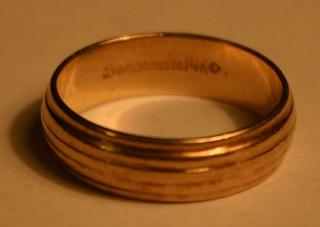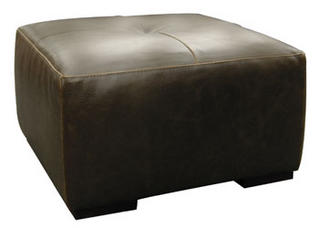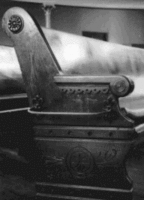James 2:2-4: "Don't Play Favorites" Pt. II
James 2:1-4
My brethren, do not hold your faith in our glorious Lord Jesus Christ with an attitude of personal favoritism. For if a man comes into your assembly with a gold ring and dressed in fine clothes, and there also comes in a poor man in dirty clothes,

So that his readers would know what he is talking about James gives and example of favoritism. We see that two men arrive for a meeting. James does not tell us exactly what this assembly is. It could be a type of formal hearing of church discipline; it could be the Christian Jews gathered in the synagogue; or most likely it was a Lord’s Day church service. James vagueness with the specifics of this gathering is not a problem, for his command not to show favoritism applies to all situations. This first man to arrive is dressed in fine clothes and even has at least one gold ring on (the word could be translated gold fingered, which might mean he had many rings on). This man was obviously wealthy, and based on his description could have even been a politician or official. The second man to arrive is described in opposite terms to the first man. This man was poor, and dressed in dirty (or shabby) clothes. Based on this man’s description he may very well have been a beggar. In each case the men were unknown. The Christians gathered together had no idea who they were, or what their character was like. They may have been interested visitors, or they may have been new converts (the later is the more favorable because it is unlikely that an unknown unbeliever would have gained such a trusted position in a community that had been so persecuted). It is most likely it was their first time at such a meeting because that had to bee shown where to sit.
and you pay special attention to the one who is wearing the fine clothes, and say, "You sit here in a good place," and you say to the poor man, "You stand over there, or sit down by my footstool,"
Here is where we will begin to see the favoritism (or discrimination depending on what your perspective is). The person greeting and seating these men fawned over the rich man (Do see how the glory of Christ is de-emphasized when we show favoritism?), and the poor man is treated with distain. This rich man was ushered right to the front where he was able to gain a seat in an honorable position. The poor man was literally left in the dust. He was told: “you can either stand over there, or you can sit by my footstool.” Literally what the poor man was told was that “you can sit under my under-feet.” Can you imagine this? Not only was this greeter not willing to give up his own seat for the poor man to sit down, but he would not even give up his foot rest for the man. “I have a seat with a footstool, but I am not going to give you either.”
Maybe this example does not quite hit home with you. Let me give you an example of a similar situation that my parents witnessed. My parents had just moved and were visiting churches trying to find a new church home. On one particular Sunday the church they were visiting concluded with an alter call. During this alter call a black man came down the aisle. The church leader quickly informed this gentleman that he would have to wait in the back of the church until all the other people (white people) had been taken care of. Can you imagine this? You may be thinking well it was a different time back then, but this was in the early ‘80s. Just twenty years ago. These types of attitudes are not exclusive to race, and economic status. Churches have the in crowd, and the onlookers. Youth groups everywhere have the popular kids and the outsiders. This is the trap that James is warning against.
this? You may be thinking well it was a different time back then, but this was in the early ‘80s. Just twenty years ago. These types of attitudes are not exclusive to race, and economic status. Churches have the in crowd, and the onlookers. Youth groups everywhere have the popular kids and the outsiders. This is the trap that James is warning against.
have you not made distinctions among yourselves,

In verse 4 we see the result of these attitudes. James asks a rhetorical question to which the obvious answer is yes. They did not want God to judge them based on anything except Christ, but they did not afford this same privilege to those around them. There are two ways that this verse can be interpreted: 1) James is restating their inappropriate behavior; 2) James is tracking the sinful behavior back to its source, a double-mind. The word that is translated here as distinction is a form of the same word that is translated as doubting in 1:6. Also this theme of double-mindedness is not uncommon in the book of James. In chapter 4 verse 8 James says: “[d]raw near to God and He will draw near to you. Cleanse your hands, you sinners; and purify your hearts, you double-minded.”
An improper division made between the rich and the poor reflects an improper division in the mind. These people are not acting consistently Christian. To display such favoritism (partiality; or discrimination) reflects a doubt in the truth expressed in 1:9-11, and later in 2:5. If they truly believed that the riches of this earth are going to pass away why did they fawn over the rich? Because their minds were divided, they were double-minded. On the one hand they saw the truth of what James taught, but they were also enticed by the riches of the world. They did not have a consistently Christian mindset; instead they were influenced by worldly considerations. We must be careful to guard ourselves against these dangers. We must constantly evaluate our actions to make sure that they are consistent with scriptural doctrine in order to avoid having a division between our faith and practice.
and become judges with evil motives?

James readers were struggling with this sin because their thinking had been defiled by the world’s thinking (1:27). To the world riches and power are of the utmost importance, but to the Christian they should be of little importance. They acted according to worldly considerations which made them show partiality towards the rich, and slight the poor. To show this kind of partiality is particularly unsettling because it is contrary to God’s character. In showing favoritism they were making themselves out to be judges, and they judged with evil motives. Think about what their motives must have been. They were treating the rich better than the poor. They must have hoped that they would receive something in return for their actions. This is so contrary to the true religion that is described by James in 1:27. They were showing favoritism to the rich, instead of the orphans and widows who could not return their favor.
They took upon themselves the rights of judge, which only God can truly exercise, and they judged based on the wrong things. Even though they professed faith in the Just God of the Universe, they made themselves unjust judges of men.
When we show favoritism, partiality, or unjust discrimination we are making ourselves out to be judges. If a judge in a court of law were to let his decisions be swayed by superficial matter rather than by the essential facts of the case, it would be a gross miscarriage of justice. It is no less wrong for Christians to base their treatment of others on such superficial matters as economic, social, or racial differences.
My brethren, do not hold your faith in our glorious Lord Jesus Christ with an attitude of personal favoritism. For if a man comes into your assembly with a gold ring and dressed in fine clothes, and there also comes in a poor man in dirty clothes,

So that his readers would know what he is talking about James gives and example of favoritism. We see that two men arrive for a meeting. James does not tell us exactly what this assembly is. It could be a type of formal hearing of church discipline; it could be the Christian Jews gathered in the synagogue; or most likely it was a Lord’s Day church service. James vagueness with the specifics of this gathering is not a problem, for his command not to show favoritism applies to all situations. This first man to arrive is dressed in fine clothes and even has at least one gold ring on (the word could be translated gold fingered, which might mean he had many rings on). This man was obviously wealthy, and based on his description could have even been a politician or official. The second man to arrive is described in opposite terms to the first man. This man was poor, and dressed in dirty (or shabby) clothes. Based on this man’s description he may very well have been a beggar. In each case the men were unknown. The Christians gathered together had no idea who they were, or what their character was like. They may have been interested visitors, or they may have been new converts (the later is the more favorable because it is unlikely that an unknown unbeliever would have gained such a trusted position in a community that had been so persecuted). It is most likely it was their first time at such a meeting because that had to bee shown where to sit.
and you pay special attention to the one who is wearing the fine clothes, and say, "You sit here in a good place," and you say to the poor man, "You stand over there, or sit down by my footstool,"

Here is where we will begin to see the favoritism (or discrimination depending on what your perspective is). The person greeting and seating these men fawned over the rich man (Do see how the glory of Christ is de-emphasized when we show favoritism?), and the poor man is treated with distain. This rich man was ushered right to the front where he was able to gain a seat in an honorable position. The poor man was literally left in the dust. He was told: “you can either stand over there, or you can sit by my footstool.” Literally what the poor man was told was that “you can sit under my under-feet.” Can you imagine this? Not only was this greeter not willing to give up his own seat for the poor man to sit down, but he would not even give up his foot rest for the man. “I have a seat with a footstool, but I am not going to give you either.”
Maybe this example does not quite hit home with you. Let me give you an example of a similar situation that my parents witnessed. My parents had just moved and were visiting churches trying to find a new church home. On one particular Sunday the church they were visiting concluded with an alter call. During this alter call a black man came down the aisle. The church leader quickly informed this gentleman that he would have to wait in the back of the church until all the other people (white people) had been taken care of. Can you imagine
 this? You may be thinking well it was a different time back then, but this was in the early ‘80s. Just twenty years ago. These types of attitudes are not exclusive to race, and economic status. Churches have the in crowd, and the onlookers. Youth groups everywhere have the popular kids and the outsiders. This is the trap that James is warning against.
this? You may be thinking well it was a different time back then, but this was in the early ‘80s. Just twenty years ago. These types of attitudes are not exclusive to race, and economic status. Churches have the in crowd, and the onlookers. Youth groups everywhere have the popular kids and the outsiders. This is the trap that James is warning against.have you not made distinctions among yourselves,

In verse 4 we see the result of these attitudes. James asks a rhetorical question to which the obvious answer is yes. They did not want God to judge them based on anything except Christ, but they did not afford this same privilege to those around them. There are two ways that this verse can be interpreted: 1) James is restating their inappropriate behavior; 2) James is tracking the sinful behavior back to its source, a double-mind. The word that is translated here as distinction is a form of the same word that is translated as doubting in 1:6. Also this theme of double-mindedness is not uncommon in the book of James. In chapter 4 verse 8 James says: “[d]raw near to God and He will draw near to you. Cleanse your hands, you sinners; and purify your hearts, you double-minded.”
An improper division made between the rich and the poor reflects an improper division in the mind. These people are not acting consistently Christian. To display such favoritism (partiality; or discrimination) reflects a doubt in the truth expressed in 1:9-11, and later in 2:5. If they truly believed that the riches of this earth are going to pass away why did they fawn over the rich? Because their minds were divided, they were double-minded. On the one hand they saw the truth of what James taught, but they were also enticed by the riches of the world. They did not have a consistently Christian mindset; instead they were influenced by worldly considerations. We must be careful to guard ourselves against these dangers. We must constantly evaluate our actions to make sure that they are consistent with scriptural doctrine in order to avoid having a division between our faith and practice.
and become judges with evil motives?

James readers were struggling with this sin because their thinking had been defiled by the world’s thinking (1:27). To the world riches and power are of the utmost importance, but to the Christian they should be of little importance. They acted according to worldly considerations which made them show partiality towards the rich, and slight the poor. To show this kind of partiality is particularly unsettling because it is contrary to God’s character. In showing favoritism they were making themselves out to be judges, and they judged with evil motives. Think about what their motives must have been. They were treating the rich better than the poor. They must have hoped that they would receive something in return for their actions. This is so contrary to the true religion that is described by James in 1:27. They were showing favoritism to the rich, instead of the orphans and widows who could not return their favor.
They took upon themselves the rights of judge, which only God can truly exercise, and they judged based on the wrong things. Even though they professed faith in the Just God of the Universe, they made themselves unjust judges of men.
When we show favoritism, partiality, or unjust discrimination we are making ourselves out to be judges. If a judge in a court of law were to let his decisions be swayed by superficial matter rather than by the essential facts of the case, it would be a gross miscarriage of justice. It is no less wrong for Christians to base their treatment of others on such superficial matters as economic, social, or racial differences.


0 Comments:
Post a Comment
<< Home